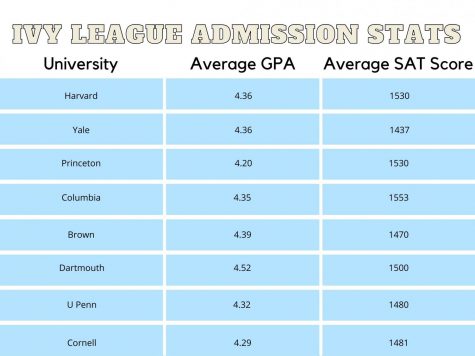High school students spend their lives cultivating and crafting transcripts and resumes, hoping to catch their dream university’s eye. They wonder what alumni’s recommendations would be, wanting to know the key to past students’ success. In the back of their minds, they quietly wonder if it will be worth it in the end.
As applicant numbers increase, admission rates decline, and colleges get more costly, alumni and college counselors can share important perspectives on students’ questions.
Chronicles of a college counselor
“The most important part of any college application is admittedly the grades,” said Pamela Anderson, a college counselor.
Looking at a student’s GPA is the easiest way for a college to see if the applicant would excel academically in their university. Through their GPA, colleges can also see students’ intellectual curiosity and passion for their chosen subjects.

According to Naviance, students admitted into Princeton, one of the top universities in the United States, had an average 4.2 GPA. Students can attain that GPA by taking at least one Advanced Placement class (AP) and having all As throughout high school.
Although this may seem like an easy goal, attaining a 4.2 is no easy task; according to TACT Research by Think Impact, the average GPA of students in U.S. high schools is 3.0.
Most universities also look at other factors in the application. Some take a common application, while some require separate essays and descriptions of the applicants.
“Holistic admissions, fortunately, includes other indicators like leadership, community service, working or internships, a talent or skill in particular. This skill could be art, music, dance, or athletics. They will also see if the student has overcome any particular obstacles and read their essays,” Anderson said.
Due to the pandemic, colleges have modified the application process. For example, test scores, like the SAT and ACT, were not required by all universities for the class of 2025. The Universities of California took it a step further and announced that by the fall of 2025, they would have students take a UC-specific standardized test in place of the SAT and ACT.
But, when it comes to the most crucial aspect of the applications, Anderson said it could only be one thing: “authenticity.”
“Be true to who you are in your application, essays, and interviews. Let your authentic self shine through. If you start asking, ‘Will this look good on my application?’ you’re on the wrong path. Make your application an honest reflection of your passions instead,” Anderson said.
UC Berkeley experiences
Ivy Leagues, all located on the East Coast, are considered some of the most prestigious universities in the United States. Another grouping of high-ranking colleges are the Universities of California (UCs), which are located on the opposite coast.
According to U.S. News, Ivy League schools make up the top three national universities. The same source revealed that UC Los Angeles is rated the 20th best university, while UC Berkeley is ranked the 22nd best national university.
Carlmont alumna Katelyn Chen is currently a freshman at the University of California, Berkeley. Chen tightly packed her transcript to ensure her admission to colleges. Although she was technically enrolled at Carlmont High School her freshman year through her senior year, Chen attended the Middle College Program at Cañada College her junior and senior years.
Middle College is a concurrent enrollment program where high school juniors and seniors can finish their high school education on a local community college campus. Students can take community college courses that later count toward the four-year college they attend.
“Some steps that made me stand out in my applications were joining certain extracurriculars. For me, that was being a headteacher at my local church’s annual summer camp for several years and joining the student government. I also think that taking coursework related to my major helped,” Chen said.
Experiences to add to a transcript can include being a camp counselor or a student government participant like Chen, but there are other opportunities. Colleges also look at job experiences, volunteering hours, sports, internships, and other extracurriculars.
Aurian Klopocki, another student enrolled at UC Berkeley, is currently in the last year of his master’s degree.
Klopocki took a much different approach to his admission than Chen. He attended high school in Paris, followed by an engineering school there. He then applied to UC Berkeley, where he is currently enrolled.
“I think that to be admitted, the most important thing is to be coherent to what you want to major in. If you have an idea of what you want your career to be, find internships available and major in that field,” Klopocki said.
The option of finding internships or ways to be submerged in a job earlier is always available. Most successful companies offer internships to high school students and undergraduate students, allowing them to gain experience and observe the inner workings of these companies.
“Doing things a little different and standing out shows a certain open-mindedness that can be sought in less technical fields and can be applied to more jobs and colleges,” Klopocki said.
Is attending an Ivy League worth it?
The application process is the first step to university admissions, but the tuition price is sometimes discouraging to applicants.
Ivy League schools and other private universities are expensive educations. The average undergraduate cost of an Ivy League is $56,425. Contrary to popular belief, however, Ivy League schools are in the same price range as other private universities.
Unlike the Ivies, UC schools are a system of public universities. UCs’ in-state and on-campus tuition prices range from $35,000 to $45,000. Like most colleges in the United States, UCs are an investment, but they are still less costly than an Ivy League.
Scholarships are available for all students, especially if they have the qualifications to attend a top university. If students still do not have the funds to pay for their admission, they can also apply for financial aid.
A question then presents itself: is the price to attend an Ivy League or another expensive university worth the education?
Stanford paid for Stéphane Kasriel’s entire tuition, and he also received a small stipend to cover living expenses. After going to high school in Paris and graduating undergraduate in France, Kasriel pursued a master’s in computer science at Stanford. There, he worked as a research assistant, which allowed his housing to be covered.
“When paying for college, I think that most undergrad classes are the same at Stanford and Ivy Leagues versus the next 10 to 50 universities. There are also a lot of good students and professors at those lesser-known schools,” Kasriel said.
Students can choose to attend a less expensive school as undergraduates and later attend an expensive one as graduate students. Transferring into a more renowned school after a few years can also improve students’ acceptance rates and the overall cost of tuition.
Renowned universities do have one advantage over lesser-known schools. Admission competition sifts through students to only accept the best or the ones they believe will be most successful, leaving attendees surrounded by a hardworking crowd.
“I honestly believe that Stanford’s graduate department attracted some of the smartest people on earth,” Kasriel said.
Attending competitive colleges ensures the preparedness of surrounding students and carries a certain weight in the working field. The competition to be admitted and the challenging level of the courses make graduating an impressive achievement to companies.
The alumni networks at Ivies, Baby Ivies, and women’s colleges are strong, and global recognition can help graduates find work. However, more and more employers are also interested in students’ character, summer experiences, internships, and leadership at their university as recruiting tools.
“There are over 4,600 schools in the U.S., so once a student finds the right school for them, they will have a fulfilling four years because they will have found their place, their people, where they can thrive as a person and as a student,” Anderson said.



